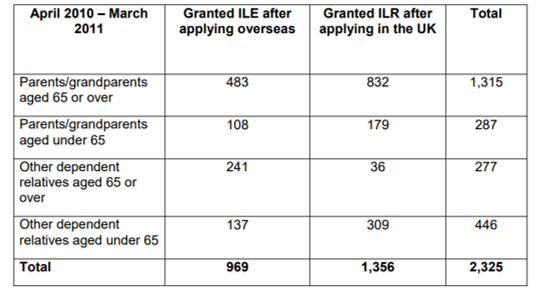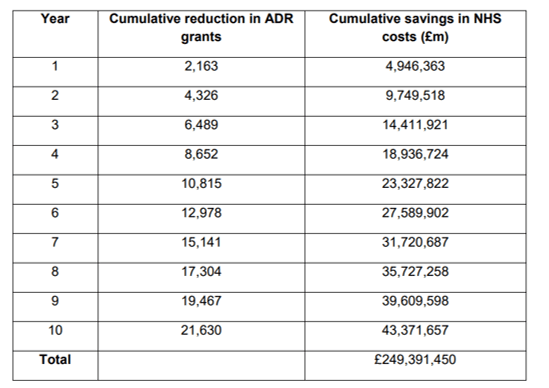Adult Dependent Relatives Need to Know This Before Applying
What is the Purpose of the Adult Dependent Route?
According to the Home Office guidance, the purpose of the Adult Dependent route is to allow an adult dependent relative of:
- a British citizen in the UK
- a person settled in the UK
- a person in the UK with refugee leave or humanitarian protection
- a person in the UK with limited leave under the EU settlement scheme
to settle here. That is, provided this adult dependent relative can demonstrate that, as a result of age, illness or disability, they require a level of long-term personal care that only their relatives in the UK can provide and do so without claiming additional benefits.
What the Majority of Potential Applicants Think
Most potential applicants (or/and their children (the Sponsors)) think that the rule is reasonable as their parent’s medical condition is not great and is deteriorating. They believe that with the help of a strong medical report, it should not be that challenging to demonstrate that a potential Adult Dependant Relative applicant requires long-term personal care.
Sadly, the statics shows an entirely different picture.
The Statistics
‘Number rules the universe.’
Pythagoras

According to the Home Office review of the Adult Dependant Relative Route, an average of 162 applications have been granted each year since 2012. According to Hansard (the traditional name of the transcripts of parliamentary debates), just 70 adult dependent relative visas were issued in 2020.
The numbers are jaw-dropping, especially if we compare them with the number of visa grants between 2010 and 2011: 2,325.
In other words, the current success rate of Adult Dependent visas is approximately 5%.
Why are the Rules so Hard to Satisfy?

According to the Home Office, a generous approach in considering Adult Dependent Relative visa applications is very expensive for UK taxpayers. To illustrate the point, they’ve taken the total number of Adult Dependent Relative visas granted between 2010 and 2011 (2,325) and between 2013 and 2014 (162) and calculated how much the annual reduction of 2,163 (2,325-162) Adult Dependent visas grants saved money for NHS. According to the table from their review, it’s almost £250mln.
Costs of the Application
In addition to the almost impossible to satisfy Adult Dependent Relative rules, let us not forget about the costs of making such visa applications.
They are very expensive:
Visa fee: £3,250
Immigration Health Surcharge: £3,120 (£624 x 5 years)
Solicitor’s fee: average between £2,500 – £4,500
Other expenses include biometrics, TB test (if applicable), approx.£100)
You can double, if not triple, these costs if the application is refused and you choose to appeal against the decision.
You Would Like to Go Ahead Anyway
Suppose money is not an issue, or if it is, you are so desperate for your Adult Dependent Relative to join you in the UK that you still want to take this risk. If you do, you need to be fully aware of the consequences your Adult Dependent Relative may potentially face if the decision-maker refuses the application.
The refusal of your Adult Dependent Relative’s visa application may potentially trigger the refusals of your future visa applications.
In the most common case scenarios, an Adult Dependent Relative, after the refusal of their visa, may still want to continue travelling to the UK as a family visitor.
However, the majority don’t realise that after submitting your Adult Dependent Relative application, this may no longer be an option for them. After making their Adult Dependent Relative visa application, they may have difficulty meeting one of the most crucial elements of the UK visitor’s visa application.
The Genuine Visitor Requirement
All UK visitors, irrespective of their nationality, need to meet the genuine visitor requirement. It consists of 5 key elements.
They need to prove that they:
- will leave the UK at the end of their visit (known as ‘the intention to return’).
- will not live in the UK for extended periods through frequent or successive visits or make the UK their main home;
- are genuinely seeking entry or stay for a purpose that is permitted under the Visitor route;
- will not undertake any of the prohibited activities;
- must have sufficient funds to cover all reasonable costs in relation to their visit without working or accessing public funds, including the cost of the return or onward journey, any costs relating to their dependents, and the cost of planned activities such as private medical treatment.
Intention to Return
Unsuccessful Adult Dependent Relative applicants may potentially have difficulty demonstrating that they have the intention to return, which is required for all family visitors. It is because by making their Adult Dependent Relative visa application, they’ve shown an intention to settle in this country.
The alleged lack of ‘intention to return’ is one the most common grounds for UK Visitor application refusals. It is also one of the most difficult ones to prove because it cannot be supported by any documents apart from merely stating the applicants’ intentions.
For this reason, if the Home Office refuses a UK visitor application on this basis, it may trigger a chain of subsequent refusals on the same basis. This is because it will be quite challenging to persuade the decision-maker that your circumstances and, therefore, your intention have changed.
Making the UK Your Main Home
There is also a danger that the refusal of the Adult Dependent Relative visa application may motivate the immigration officers to check if you meet the second important element of the genuine visitor requirement. In other words, you will ‘not live in the UK for extended periods through frequent or successive visits, or make the UK their main home’.
There were a number of cases where the immigration officer went as far as counting the days of the family visitors’ presence in the UK. As a result, in some cases, UK visitors were not allowed to enter the UK despite having valid UK Visitor entry clearance (visa).
Assess the Merits of Your Adult Dependent Relative Visa Application
For the reasons above, it is incredibly important to carefully assess the merits of the Adult Dependent Relative Visa application before applying. If the application does not have a strong chance of succeeding, it’s better not to waste money, time and effort on making hopeless applications.
Most importantly, in these circumstances, by making a decision not to make an Adult Dependent Relative visa application, you will not ‘burn the bridges’ that you will never be able to rebuild. In other words, by deciding not to apply via the Adult Dependant Relative route, you’ll give yourself an opportunity to continue visiting your loved ones in the UK as family visitors.
Further Guidance on Assessing the Adult Dependent Route
After analysing the refusals of Adult Dependent Relative visa applications, whether made independently or with the help of immigration advisors, it became immediately clear that, unfortunately, none of them qualified. It was very unsettling to see how applicants spent thousands of pounds on applications with very low chances of success.
Therefore, I’ve created the ‘How to Avoid the Refusal of Your Adult Dependent Relative Visa Application’ online course. In this course, I explain the rules for making an Adult Dependent Relative visa application. I also concentrate on the documents that every applicant should consider submitting with the application. Most importantly, I give examples of hopeless applications and those that may potentially succeed. After watching this course, you’ll be able to check your chances of succeeding in a potential Adult Dependent Relative visa application.
Your Questions
Additionally, in this course, I answer many questions, such as:
- How to meet the financial requirement?
- Can the 3rd party support?
- Can you meet the financial requirement by showing your savings?
- Why is it not enough to show that an ADR is so ill that they cannot perform day-to-day tasks such as cooking, dressing and washing themselves? What further steps should you take to succeed in the application?
- How can you meet the accommodation requirement, especially if you live in rented accommodation?
- What is the ratio between the number of rooms and people living in a property so it is not considered overcrowded by the Home Office? For example, how many people can live in a 2-bedroom flat?
- What are the weakest parts of the majority of Adult Dependent Relative visa applications?
- Why you should think very carefully before making an Adult Dependent Relative visa application if you would like to continue coming to the UK as a family visitor.
- What is Article 8? Why is it important to engage it in the application? How to do it?
- What documents should you consider submitting with the application? You’ll find very specific examples of 35 documents which will strengthen the application and what documents not to submit:
For example:
- Not that many people are aware that they should submit a very carefully drafted care plan. What is a care plan, and where can you get a template?
- What are the general rules about the format of all the documents?
- What are the rules for converting foreign currency into GBP?
- Where to find a list of all the documents that the Home Office advises to submit with the application.
- Which period should these documents cover?
You can get more information and access the course HERE.
